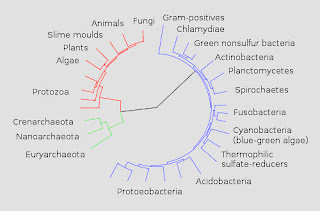Like any specialized topic, veganism has it's own jargon. A tern I see gaining traction is 'plant-based,' as in a 'plant-based diet.' Beyond being incorrect on a biological ground, I dislike how the phrase oversimplifies the concept to a binary model of us-versus-them.
Plants and and animals, or more properly Plantae and Animalia, are just two kingdoms of life. If you were born in a previous millennium like I was, you may vaguely remember learning these as the only two. If you paid attention past grammar school, you may remember another kingdom, Protista, which popped in to account for all those wee things that weren't quite plant nor animal. Later others like Fungi and Monera were popularized, the latter broken up again into Archaea and Bacteria. Like many areas in phylogeny, changes are still occurring due to advancements in genetics, but most biology textbooks currently have six kingdoms: Bacteria, Archaea, Protista, Plantae, Fungi, and Animalia.
To take it even further back, things used to be classified as animal, vegetable, or mineral, and still are if you play twenty questions. Even if a person eschews any synthetic additives from their diet, they still need sodium chloride and other inorganic minerals that do not derive from living organisms.
I know people who eat portabella burgers (fungi) with a sprinkle of salt (mineral), a side of non-dairy yogurt (bacteria), and seaweed salad (protista) can still keep a plant-based diet. The main basis is still plants. And actually that sounds like a good option for dinner. However, a flexitarian also has a plant-based diet, despite eating some animal flesh.
Because most vegans and the like want to differentiate themselves from omnivores, a term like plant-exclusive would be better, if they ate exclusively plants and not other organisms. I know many folks hate defining themselves in terms of a negative, preferring "I eat plants" to "I don't eat animals," but we're going to have to suck it up here. Something like an animal-abstaining diet and not plant-protist-fungi-bacteria-and-mineral-based diet.
However, only a vegan diet and it's subgenres (raw vegan, fruitarian) abstain from animal products. So why not say vegan? If one wants to include vegetarians and vegans in one term, that term is vegetarian. If one wants to include flexitarians, macrobiotic folks, and anyone who isn't a meat-and-potatoes omnivore, then a new term is required. Maybe nomnivore? Herbivore? Animal-minimizing diet? What do you think?
12 September 2011
02 September 2011
Cruelty-Free Meat or Cheat?
After my last post got scooped, besides thanking my stars that I have civil readers, I decided to raise the bar with another facet of the story. I must caution, things are about to get all Buddhist up in here.
Ok, assuming you eat meat, would it make a difference if the animal did not suffer? The market for free-range meat products, often at a premium, indicates that many people think so. How about if the animal is from a factory farm, yet led a pain-free existence? Sounds like a contradiction, but it does not have to be. That is, if the animal was incapable of feeling pain.
According to an op-ed by a philosophy-neuroscience-psychology PhD student at Washington University in St. Louis, eliminating the sensation of pain is the least we can do for those we sacrifice for the dinner plate. I do not agree. I think the least we could do is to go vegan, but hey that's me.
The author notes several ways to eliminate pain (yet not my idea), the first is "by damaging a laboratory rat’s anterior cingulate cortex, or by injecting the rat with morphine, [this will] block its affective perception of pain." Some may think it trite, but when making an ethical choice about another, it helps to compare the choice to one involving oneself or one's own kind. If the answers are different, one should explore why. In this case, would it be ethical for me to beat up a person high on morphine or with a damaged anterior cingulate cortex? Even if in the latter case they were more likely to be Republican? I'd say no. Plus we all know Kick Ass is a good guy.
Later in the article is mentioned the research of Min Zhou at University of Toronto and that of Zhou-Feng Chen also at WUSTL. Neither of which illustrate more than a step towards a freedom from pain, as they mention the animal feeling pain but not reacting the same. I don't see how anyone would find this as an improvement, except for factory farmers who want docile and more manageable animals. I suppose the pain could be registering but not feel bad, but that doesn't seem much better.
I think we need to analyze the aspects of pain and suffering. Pain stems from some kind of damage to an organism. The damage triggers signals which send a message to the brain that damage has occurred. Often receipt of the message causes additional 'damage.' I'll go through this backwards, from the recipient to the source.
To use an analogy, someone steals money from your bank account, the bank sends you an email, you read it, then you feel bad. Ideally, we should eliminate all the aspects at the source: No theft. If the money is stolen, damage is still done whether the theft is noticed or not.
Let's say an animal is changed so they, like a Terminator, receive the pain message and sense it but do not 'feel' it. The damage is done, and the money is gone. They may act less emotionally, and perhaps do not suffer, but I don't think the argument could be made that it is cruelty free.
If you simply must steal the money (which you do not), is stopping the message from being sent or received better? Is no news good news? The damage is still done, and perhaps it's worse to act like nothing happened. Pain has a purpose. If your wing is hurt, and you feel the pain, you can try to favor the other side and protect the sensitive area so it can heal. If you didn't know you had an injury, and kept bumping it, it would get worse and fester. Your quality of life would lessen, perhaps severely.
I remember a heated debate within my college's animal rights group about direct action and violence. Some thought that destroying inanimate objects like a lab, was non-violent if no animals were harmed. Others thought blowing something up was inherently violent. I suppose a similar argument could be made concerning unfelt or pain-free harm done to an animal.
Also, one should consider the issue of consent. If a being is suffering, and one can eliminate the suffering, typically that does not require consent unless the subject is a Christian Scientist. If however, the situation involves alleviating pain that one is causing and will continue to cause intentionally, I would think this would need some kind of agreement. Would you want any of these permanent changes made to you so not feel/sense pain/suffering?
Ok, assuming you eat meat, would it make a difference if the animal did not suffer? The market for free-range meat products, often at a premium, indicates that many people think so. How about if the animal is from a factory farm, yet led a pain-free existence? Sounds like a contradiction, but it does not have to be. That is, if the animal was incapable of feeling pain.
According to an op-ed by a philosophy-neuroscience-psychology PhD student at Washington University in St. Louis, eliminating the sensation of pain is the least we can do for those we sacrifice for the dinner plate. I do not agree. I think the least we could do is to go vegan, but hey that's me.
The author notes several ways to eliminate pain (yet not my idea), the first is "by damaging a laboratory rat’s anterior cingulate cortex, or by injecting the rat with morphine, [this will] block its affective perception of pain." Some may think it trite, but when making an ethical choice about another, it helps to compare the choice to one involving oneself or one's own kind. If the answers are different, one should explore why. In this case, would it be ethical for me to beat up a person high on morphine or with a damaged anterior cingulate cortex? Even if in the latter case they were more likely to be Republican? I'd say no. Plus we all know Kick Ass is a good guy.
Later in the article is mentioned the research of Min Zhou at University of Toronto and that of Zhou-Feng Chen also at WUSTL. Neither of which illustrate more than a step towards a freedom from pain, as they mention the animal feeling pain but not reacting the same. I don't see how anyone would find this as an improvement, except for factory farmers who want docile and more manageable animals. I suppose the pain could be registering but not feel bad, but that doesn't seem much better.
I think we need to analyze the aspects of pain and suffering. Pain stems from some kind of damage to an organism. The damage triggers signals which send a message to the brain that damage has occurred. Often receipt of the message causes additional 'damage.' I'll go through this backwards, from the recipient to the source.
To use an analogy, someone steals money from your bank account, the bank sends you an email, you read it, then you feel bad. Ideally, we should eliminate all the aspects at the source: No theft. If the money is stolen, damage is still done whether the theft is noticed or not.
Let's say an animal is changed so they, like a Terminator, receive the pain message and sense it but do not 'feel' it. The damage is done, and the money is gone. They may act less emotionally, and perhaps do not suffer, but I don't think the argument could be made that it is cruelty free.
If you simply must steal the money (which you do not), is stopping the message from being sent or received better? Is no news good news? The damage is still done, and perhaps it's worse to act like nothing happened. Pain has a purpose. If your wing is hurt, and you feel the pain, you can try to favor the other side and protect the sensitive area so it can heal. If you didn't know you had an injury, and kept bumping it, it would get worse and fester. Your quality of life would lessen, perhaps severely.
I remember a heated debate within my college's animal rights group about direct action and violence. Some thought that destroying inanimate objects like a lab, was non-violent if no animals were harmed. Others thought blowing something up was inherently violent. I suppose a similar argument could be made concerning unfelt or pain-free harm done to an animal.
Also, one should consider the issue of consent. If a being is suffering, and one can eliminate the suffering, typically that does not require consent unless the subject is a Christian Scientist. If however, the situation involves alleviating pain that one is causing and will continue to cause intentionally, I would think this would need some kind of agreement. Would you want any of these permanent changes made to you so not feel/sense pain/suffering?
Subscribe to:
Posts (Atom)







